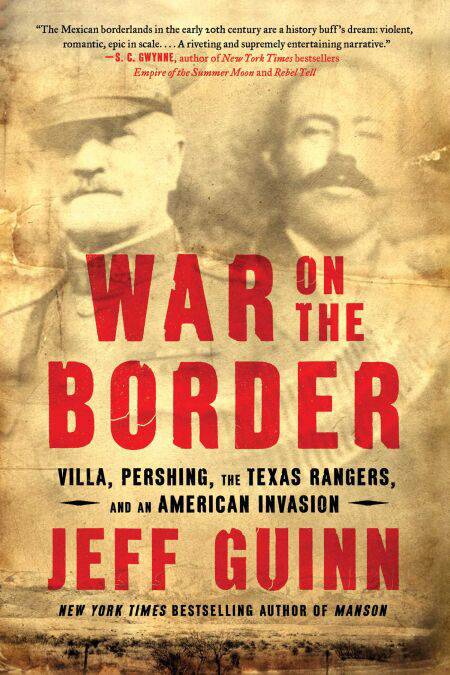
Je cadeautjes zeker op tijd in huis hebben voor de feestdagen? Kom langs in onze winkels en vind het perfecte geschenk!
- Afhalen na 1 uur in een winkel met voorraad
- Gratis thuislevering in België vanaf € 30
- Ruim aanbod met 7 miljoen producten
Je cadeautjes zeker op tijd in huis hebben voor de feestdagen? Kom langs in onze winkels en vind het perfecte geschenk!
- Afhalen na 1 uur in een winkel met voorraad
- Gratis thuislevering in België vanaf € 30
- Ruim aanbod met 7 miljoen producten
Zoeken
War on the Border E-BOOK
Villa, Pershing, the Texas Rangers, and an American Invasion
Jeff Guinn
E-book | Engels
€ 15,65
+ 15 punten
Uitvoering
Omschrijving
An “engagingly written” (The Wall Street Journal) account of the “Punitive Expedition” of 1916 that brought Pancho Villa and Gen. John J. Pershing into conflict, and whose reverberations continue in the Southwestern US to this day.
Jeff Guinn, chronicler of the Southwestern US and of American undesirables (Bonnie and Clyde, Charles Manson, and Jim Jones) tells the “riveting and supremely entertaining narrative” (S.C. Gwynne, New York Times bestselling author of Empire of the Summer Moon) of Pancho Villa’s bloody raid on a small US border town that sparked a violent conflict with the US. The “Punitive Expedition” was launched in retaliation under Pershing’s command and brought together the Army, National Guard, and the Texas Rangers—who were little more than organized vigilantes with a profound dislike of Mexicans on both sides of the border. Opposing this motley military brigade was Villa, a guerrilla fighter who commanded an ever-changing force of conscripts in northern Mexico.
The American expedition was the last action by the legendary African American “Buffalo Soldiers.” It was also the first time the Army used automobiles and trucks, which were of limited value in Mexico, a country with no paved roads or gas stations. Curtiss Jenny airplanes did reconnaissance, another first. One era of warfare was coming to a close as another was beginning. But despite some bloody encounters, the Punitive Expedition eventually withdrew without capturing Villa.
Today Anglos and Latinos in Columbus, New Mexico, where Villa’s raid took place, commemorate those events, but with differing emotions. And although the bloodshed has ended, the US-Mexico border remains as vexed and volatile an issue as ever.
Jeff Guinn, chronicler of the Southwestern US and of American undesirables (Bonnie and Clyde, Charles Manson, and Jim Jones) tells the “riveting and supremely entertaining narrative” (S.C. Gwynne, New York Times bestselling author of Empire of the Summer Moon) of Pancho Villa’s bloody raid on a small US border town that sparked a violent conflict with the US. The “Punitive Expedition” was launched in retaliation under Pershing’s command and brought together the Army, National Guard, and the Texas Rangers—who were little more than organized vigilantes with a profound dislike of Mexicans on both sides of the border. Opposing this motley military brigade was Villa, a guerrilla fighter who commanded an ever-changing force of conscripts in northern Mexico.
The American expedition was the last action by the legendary African American “Buffalo Soldiers.” It was also the first time the Army used automobiles and trucks, which were of limited value in Mexico, a country with no paved roads or gas stations. Curtiss Jenny airplanes did reconnaissance, another first. One era of warfare was coming to a close as another was beginning. But despite some bloody encounters, the Punitive Expedition eventually withdrew without capturing Villa.
Today Anglos and Latinos in Columbus, New Mexico, where Villa’s raid took place, commemorate those events, but with differing emotions. And although the bloodshed has ended, the US-Mexico border remains as vexed and volatile an issue as ever.
Specificaties
Betrokkenen
- Auteur(s):
- Uitgeverij:
Inhoud
- Aantal bladzijden:
- 368
- Taal:
- Engels
Eigenschappen
- Productcode (EAN):
- 9781982128883
- Verschijningsdatum:
- 17/05/2021
- Uitvoering:
- E-book
- Beveiligd met:
- Adobe DRM
- Formaat:
- ePub

Alleen bij Standaard Boekhandel
+ 15 punten op je klantenkaart van Standaard Boekhandel
Beoordelingen
We publiceren alleen reviews die voldoen aan de voorwaarden voor reviews. Bekijk onze voorwaarden voor reviews.









